Where to Buy the Best Food for Ducks: A Complete Guide
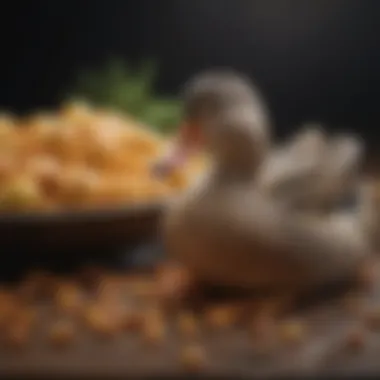
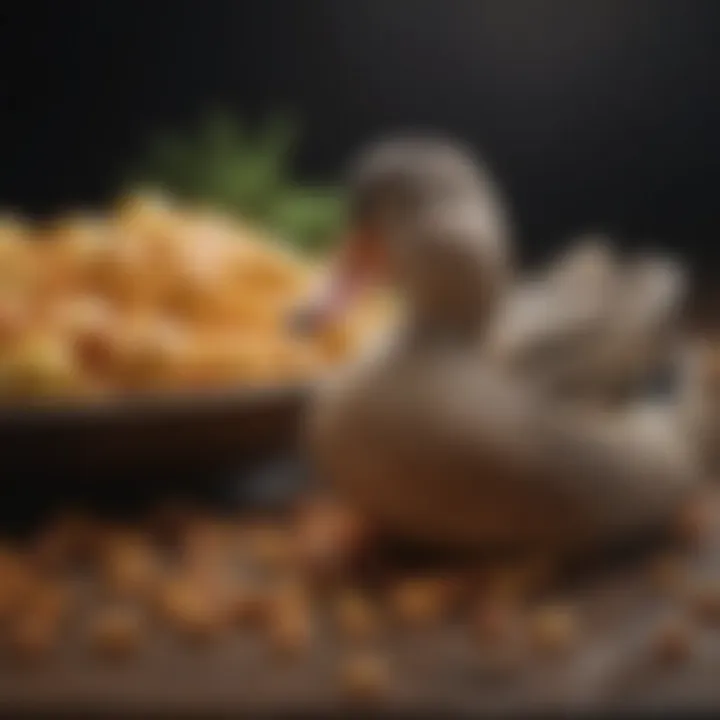
Intro
Ducks are charming creatures that can bring joy to any backyard. However, to keep them happy and healthy, one vital aspect is providing them with the right food. With a myriad of options available in the market, navigating where to buy high-quality food for ducks can be overwhelming for some owners. This guide aims to cut through the clutter, providing insight into the various sources for purchasing duck food, whether it’s straight from specialty stores or through online platforms.
Understanding what ducks need nutritionally is critical. Different stages of life and various species have unique dietary requirements. From a peck of grains to a sprinkle of seeds and some fresh greens, integrating a mix of these options ensures your ducks thrive.
In addition to nutritional needs, environmental considerations come into play as well. Eco-friendly options are also gaining attention among conscientious owners. This guide not only addresses where to get the best duck food but also highlights how to shop smartly and sustainably.
Understanding Duck Nutrition
Before diving into where to buy food, let’s unpack the dietary needs of ducks. Ducks require a balanced diet that comprises:
- Grains: Such as corn and wheat, which provide energy.
- Greens: Fresh clover, cabbage, and leafy vegetables support digestive health.
- Protein Sources: Such as peas and worms, which are particularly important for growing ducks.
- Specialty Feeds: These are formulated to cater to ducks' specific nutritional requirements.
Recognizing these components will help guide purchasing decisions when selecting food for your feathered friends.
Where to Find Duck Food
When considering options for purchasing duck food, one can leverage both online and offline avenues.
Local Feed Stores
Local agricultural supply stores, or feed stores, are often the best spot to begin your search. They usually carry various types of duck feed, including organic options. Plus, there's the added benefit of discussing with the staff, who often have experience with local wildlife.
Pet Supply Retailers
Chain and independent pet supply stores frequently stock specialty duck foods. Familiar names like Petco and PetSmart offer both dry pellets and suitable treats. Check out their seasonal promotions for notable savings.
Online Retailers
In today’s digital age, online shopping has risen to prominence. Websites like Chewy.com or Amazon offer convenience and often a broader selection. Positive reviews can help gauge the quality of specific brands.
Farmer's Markets
Don’t overlook local farmer’s markets. Some vendors might sell grains or greens that are perfect for ducks. Building relationships with local farmers can lead to unique, fresh options that large retailers don't provide.
"Feeding ducks is not just about filling a trough; it’s about nourishing their hearts and soul too."
Closure
In essence, knowing where to find food specifically designed for ducks is an essential part of ensuring their health and happiness. From local feed stores to online marketplaces, the options can appeal to a variety of preferences and lifestyles. By understanding the dietary needs of ducks and the best places to buy food, pet owners not only nourish their flocks but also embrace a rewarding, caring relationship with their avian companions.
Prolusion to Duck Nutrition
Ducks, often overlooked as simple pets, have complex nutritional needs that significantly affect their health, well-being, and even their egg production. Understanding these needs is the cornerstone of giving them a balanced diet. In this section, we will explore the key aspects of duck nutrition, diving into what makes their diet unique compared to other animals. This knowledge is essential for any pet owner wishing to ensure their feathered friends thrive.
A well-nourished duck not only exhibits vibrant plumage and energy but also enjoys a robust immune system, which is crucial for a longer lifespan. Nutritional understanding leads to better purchasing decisions when it comes to both commercial feeds and alternative food sources.
Understanding Nutritional Requirements
Ducks are omnivores by nature, meaning their diet should encompass a variety of food groups. Their nutritional requirements can vary by age, breed, and whether they are raised for meat, eggs, or simply as pets. Generally, ducks require five main components in their diet: protein, carbohydrates, fats, vitamins, and minerals.
- Protein is vital for growth, feather development, and reproduction. Ducks should receive adequate protein from sources like insects, legumes, and certain commercial feeds that come enhanced with protein levels suitable for them.
- Carbohydrates offer the necessary energy for daily activities. Grains such as corn, wheat, and oats are excellent sources of carbs.
- Fats are also crucial in moderation. They provide concentrated energy that supports ducks during cold weather and while laying eggs.
- Vitamins and minerals help in various bodily functions, from bone health to feather quality. Calcium and phosphorus are particularly important for egg-laying hens.
This balance is not just a textbook concept. It impacts how your ducks behave, how active they are, and how healthy they remain over time.
The Role of Grains and Vegetables
Grains and vegetables form the bulk of a duck's diet and play an indispensable role in maintaining their health. Grains are especially important since ducks have efficient digestive systems that handle them well. However, not all grains are created equal; some are healthier and more beneficial than others.
- Grains like barley and oats are high in fiber, aiding digestion, whereas corn provides energy but must be fed cautiously to ensure it's not the sole diet component.
- Vegetables also add vital nutrients to their meals. Leafy greens, for example, are packed with necessary vitamins and stimulate their foraging instincts. Ducks enjoy nibbling on vegetables like lettuce, kale, and peas.
When including grains and vegetables, it's essential to be mindful of the portion sizes. Too much of any one type can lead to health issues, such as obesity or nutritional imbalances.
"A duck's diet should reflect its natural foraging behavior, promoting overall health and harmony with the environment."
Commercial Duck Feed Options
When it comes to feeding ducks, selecting the right commercial duck feed is a fundamental aspect that can have a direct impact on their overall health and well-being. Contributing to optimal growth, feather development, and egg production, these feeds are specially formulated to meet the dietary requirements of ducks. This section will delve into the various types of commercial duck feed available and provide a framework for evaluating different brands.
Types of Commercial Duck Feed
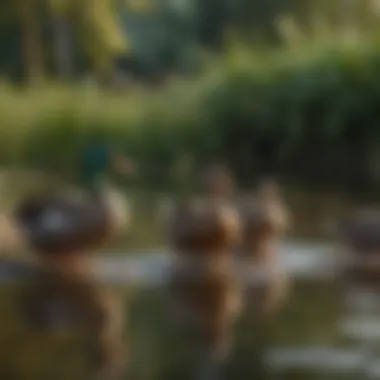
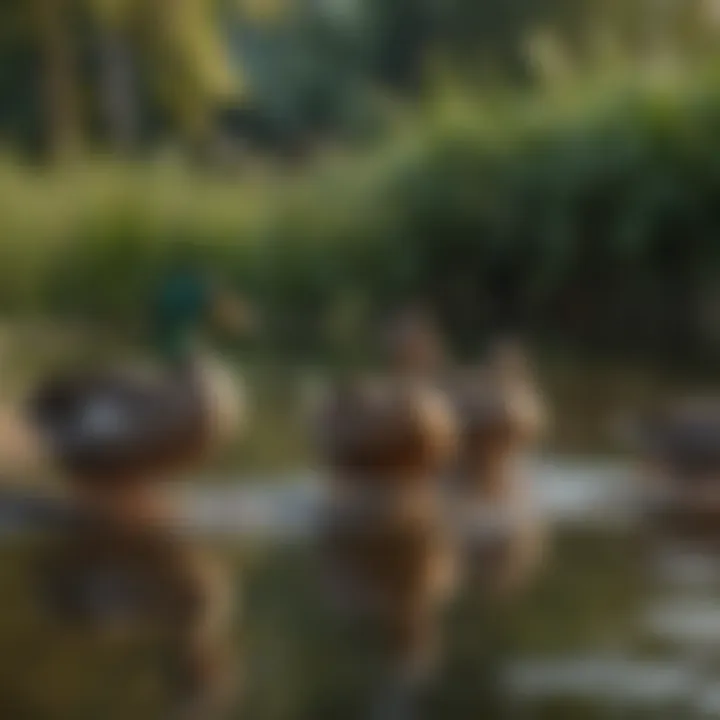
Pellets
Pellets are a popular choice among many duck owners due to their convenience and balanced nutrition. These feeds are compact, often uniform in size, making them easy to measure and distribute, ensuring that ducks receive a consistent diet. One key characteristic of pellets is their high-density nutrition, allowing ducks to eat less while still obtaining all necessary vitamins and minerals.
Additionally, the typically low dust content in pellets reduces wastage and mess, a benefit many find appealing. However, one must be aware that some ducks may initially resist pellets, as they can be different from natural food sources. Thus, patience may be required during the transition period.
Crumbles
Crumbles can be another excellent option for feeding ducks. They consist of larger particles compared to pellets, which some ducks might find more palatable. One of the key selling points of crumbles is their ease of consumption, allowing younger ducks or those with less aggressive feeding habits to partake without difficulty.
The texture of crumbles can also appeal to ducks who prefer a more varied eating experience. However, they may create more dust and be slightly messier than pellets. The potential disadvantage of crumbles is that they might not maintain their nutritional integrity as well over time if exposed to air, so it's wise to store them properly.
Mash
Mash is another form of commercial duck feed that comes in the form of a powdery substance. One defining attribute of mash is its versatility, as it can be easily mixed with water to create a mash consistency, making it suitable for various age groups of ducks.
While it serves as a great base for homemade mixtures and enhances hydration, it can also lead to a bit of a feeding frenzy, where ducks might inadvertently overeat. Given its loose structure, mash can also be more prone to spillage, so careful feeding practices are needed to cut down on waste.
Evaluating Brands
Selecting a reliable brand of duck feed can significantly influence the health and happiness of your ducks. It’s essential to consider the brand’s reputation, ingredients used, and cost-effectiveness.
Reputation
When assessing the reputation of a brand, one should look beyond the flashy marketing campaigns. A reputable brand often reflects a commitment to quality, which is crucial in poultry nutrition. Checking reviews from other duck owners can provide insight into the brand's trustworthiness and reliability. A brand with a longstanding positive reputation likely has a proven track record in delivering effective nutritional products.
Ingredients
Paying attention to the ingredient list is vital in ensuring your ducks receive all necessary nutrients. High-quality ingredients indicate a well-formulated feed that caters to the specific needs of ducks. Look for feeds that primarily contain grains, protein sources, and necessary vitamins and minerals. Avoid feeds with excessive fillers or by-products, which can compromise the dietary intake of essential nutrients.
Cost
Cost is an unavoidable factor when deciding on the right duck feed. While it may be tempting to choose the cheaper option, understanding the cost-to-value ratio is paramount. A low-cost feed could cut corners in quality, which can lead to nutritional deficiencies in your ducks over time. It's better to invest in a reliable, slightly more expensive feed that offers comprehensive nutrition—this will pay dividends in the long run, impacting the health and productivity of your ducks.
Remember, you are what you eat, and this holds true for your feathered friends as well. Opt for feeds that prioritize quality, even if it means spending a bit more.
Where to Buy Commercial Duck Feed
Understanding where to source commercial duck feed is essential for those committed to the health and happiness of their feathered companions. Unlike everyday feed options, commercial feeds are specially formulated to meet the nutritional needs of ducks. This section dives into three primary shopping avenues: local pet supply stores, farm supply stores, and online retailers. The focus is on specific advantages and considerations that potential buyers should keep in mind when deciding on the best places to purchase their duck food.
Local Pet Supply Stores
Local pet supply stores represent a convenient option for many duck owners. These establishments typically carry a variety of duck feeds alongside products for other types of pets. One major advantage of shopping at local stores is the ability to consult with knowledgeable staff. Many employees are accustomed to questions about animal nutrition and can help guide your selection based on your ducks' age, size, and needs.
However, selection can vary significantly from one store to another, depending on location and demand. It's wise to visit a few different shops to compare the types of feeds available. Additionally, supporting local businesses can foster a community connection, ensuring that pet supply stores continue to meet the needs of local animal lovers.
Farm Supply Stores
Farm supply stores often carry feeds tailored specifically for farm animals, including ducks. These retailers generally have a wider variety of bulk options, making them a suitable choice for duck enthusiasts with larger flocks. The main benefit here is purchasing in bulk can often lead to cost savings. For instance, buying a sack of feed sufficient for several weeks can be more economical than repeatedly buying smaller bags at a local pet store.
Another advantage is the extensive product range; you’ll likely find different formulations designed for various life stages and dietary requirements. However, be mindful that farm supply stores may not always offer the same level of personal service as smaller pet shops, so coming prepared with questions can be beneficial.
Online Retailers
In this digital age, online shopping has become a reliable option for many pet owners seeking duck food. Online retailers offer a convenient way to compare products from various brands without the need to travel.
Comparison Shopping
When it comes to Comparison Shopping, online platforms excel in allowing buyers to evaluate different brands side by side. You can easily assess factors such as ingredients, cost, and customer reviews. This feature is especially beneficial since it informs your decision-making and ensures that you are choosing a feed that aligns with your ducks' nutritional needs. Knowing what others think about a product can save you time and money in the long run.
However, one disadvantage is that information overload might make the decision process overwhelming. It's essential to prioritize which criteria matter most to you and your ducks.
Shipping Considerations
Shipping considerations are very significant when buying duck food online. Many online retailers offer free or reduced shipping if you meet a minimum order threshold. This aspect can make bulk buying not only logical but also budget-friendly. However, be cautious about potential extra costs; shipping fees can add up if you’re ordering less frequent quantities.
Delivery times can vary greatly, especially if you live in remote areas. It's advisable to plan ahead and ensure you don’t run into unexpected delays that could leave you short on feed at a crucial time. In summary, each of these sources—local pet supply stores, farm supply stores, and online retailers—offers unique benefits. By carefully considering your options, you can make informed decisions that best support the well-being of your feathered friends.
Alternative Food Sources for Ducks
Ducks, those charming waterfowl often spotted paddling peacefully in ponds, don't simply thrive on commercial feed. An engaging aspect of their nutrition involves alternative food sources, which can provide vital nutrients while also adding variety to their diet. This section explores suitable options like fruits and vegetables, as well as kitchen scraps, emphasizing the benefits and necessary precautions pet owners should be aware of.
Fruits and Vegetables
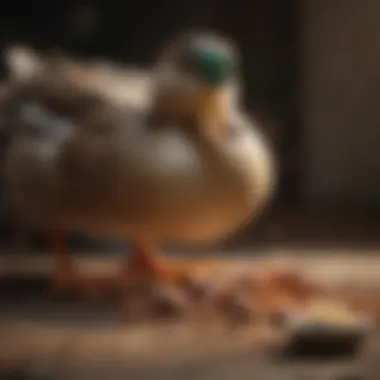
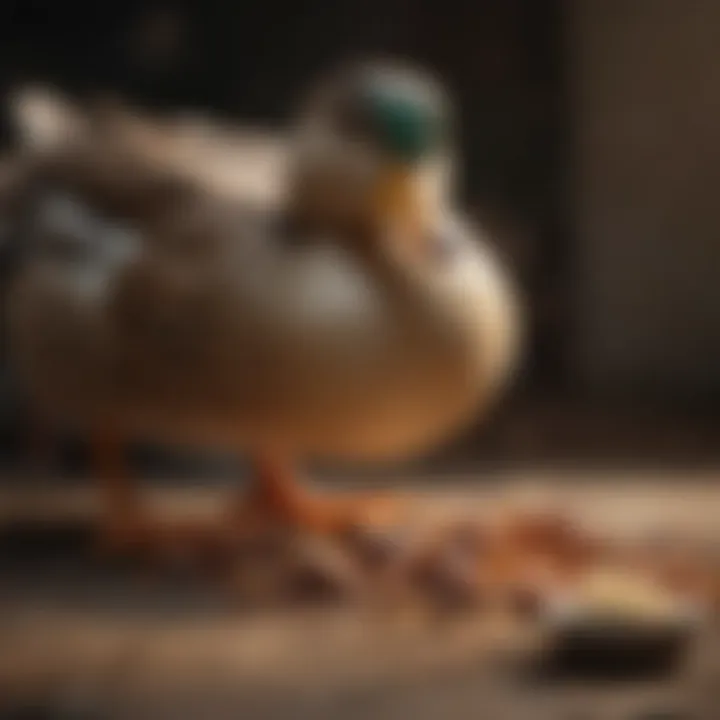
Common Choices
Fruits and vegetables can be a delightful addition to a duck's diet, providing essential vitamins and minerals. Choices like peas, corn, and carrots stand out as popular selections among duck enthusiasts due to their palatability and nutritional value. Peas, for instance, are rich in protein and fiber, helping support a healthy digestive system.
Additionally, these foods are often available and affordable, making them an appealing option for pet owners looking to enhance their duck's meals without breaking the bank. However, it's important to chop produce into smaller pieces to prevent choking hazard.
One unique feature of fruits and vegetables is their high moisture content, which keeps ducks hydrated, especially during warm summer months. While these options are generally beneficial, over-reliance on any single food type might lead to imbalances in diet.
Safety Considerations
Understanding safety is crucial when introducing fruits and vegetables into a duck's diet. Certain foods can be harmful. For instance, avocados contain a substance called persin, which can be toxic to birds. It's essential to ensure that the fruits and veggies offered are safe and appropriate for ducks.
A key characteristic of safety considerations is the need for variety. Feeding a range of fruits and vegetables minimizes the risk of nutritional deficiencies and keeps the diet well-rounded. However, the main downside can be the need for adequate knowledge about which foods are safe and which ones to steer clear from. Engaging with community resources or reputable online forums can help clarify these uncertainties, ensuring ducks receive safe nutritious meals.
Kitchen Scraps
Safe Options
Many pet owners might be surprised to learn that kitchen scraps can be safe and nutritious for ducks. Items like lettuce, cucumbers, or even bits of bread can be suitable treats. This not only reduces food wastage but also adds exciting new flavors to a duck's diet.
A highlight for safe options is their consistency – they’re often available and cost-effective. When preparing kitchen scraps, make sure to avoid processed foods as they could include harmful additives. Scraps generally reflect variety, so experimenting with different kinds of vegetable remnants can lead to discovery of preferred flavors.
Avoiding Harmful Foods
Conversely, understanding harmful foods is equally important while considering kitchen scraps. Certain items shouldn't make their way into a duck's diet; for instance, chocolate, caffeine, and onion can be detrimental. The challenge lies in distinguishing between what might seem inconsequential and what could actually pose a risk.
The key to avoiding harmful foods is education. Pet owners should devote time to research or consult various guides that detail safe and unsafe kitchen scraps. Failure to identify these hazards could lead to health problems for ducks. While using kitchen scraps as food sources can be practical, ensuring safety requires vigilance and knowledge.
In summary, alternative food sources enrich the dietary options available for ducks. Engaging with fresh fruits and vegetables or wisely selected kitchen scraps not only broadens their nutritional profile but also adds a whimsical touch to their feeding routine. Pet owners should remain informed and mindful, balancing these options with standard feeds to sustain the wellbeing of their feathered companions.
Eco-Friendly Feeding Practices
When pondering the feeding practices for your ducks, adopting eco-friendly methods takes precedence. This isn’t just about the welfare of your feathery friends; it’s about our planet too. Opting for sustainable feeding habits means being aware of where food comes from and how it impacts the environment. Eco-conscious practices ensure that you provide nutritious sustenance while playing your part in conserving resources and reducing waste. By focusing on such choices, pet owners can cultivate a conscientious approach to animal husbandry that supports the environment.
Organic Feed Options
Organic feed options have gained traction for their numerous benefits. These products are made from ingredients produced without synthetic fertilizers, pesticides, or genetically modified organisms. Choosing organic feed is akin to planting seeds for a healthy future, benefiting both your ducks and the larger ecosystem. Ducks that consume organic materials can exhibit better health and vitality, leading to higher egg production and more robust growth phases.
- Healthier Ducks: Studies have shown that organic-fed ducks often display improved immune systems and better overall health.
- Environmental Benefits: By selecting organic options, you're often supporting smaller farms that practice sustainable farming, reducing harm to soils and surrounding waterways.
- Nutritional Value: Organic feeds typically have a higher nutrient density, offering your ducks a well-rounded diet.
It’s important to note that organic doesn’t automatically mean perfect. Be sure to read labels and know your brands well; just because something is labeled organic doesn’t mean it’s a good fit for your ducks.
Sustainable Sourcing
Sustainable sourcing goes hand in hand with the idea of responsibility. It involves obtaining duck food in a way that ensures the long-term viability of resources. When pet owners actively pursue sustainable options, they help reduce their ecological footprint. Sourcing feed from local growers, for instance, decreases transportation emissions. Moreover, local sourcing often supports community agriculture, fostering a connection between consumers and farmers.
Considerations for Sustainable Sourcing:
- Local Farms: Supporting local farms can be a win-win; you get fresh feed while contributing to your community’s economy.
- Seasonal Availability: Aligning the diet of your ducks with local seasonal produce can lead to nutrient-rich meals for them, while also promoting biodiversity.
- Minimal Waste: Look for suppliers who emphasize reducing packaging waste. Bulk buying can be a great way to trim down on excess.
Sustainable sourcing is not just a trend; it’s a pledge to care for the earth and the creatures that inhabit it. By making wiser choices, pet owners can ensure their duck companions flourish and the environment remains protected.
With conscious efforts in choosing organic and sustainably sourced feeds, duck owners can not only nourish their ducks but also contribute to a more resilient planet. Such actions ripple outwards, benefiting the broader ecosystem and fostering a healthier world for future generations.
Considerations for Seasonal Changes
Understanding the seasonal changes impacting duck diets is essential for keepers aiming to ensure their birds flourish throughout the year. Ducks, like many creatures, experience shifts in their nutritional needs based on environmental temperature, food availability, and their unique biological rhythms. Seasonal considerations can help pet owners manage not only the health of their ducks but also their overall well-being.
One key element is recognizing how ducks adapt to cold and warm climates. During winter, their metabolism increases to generate warmth. This can lead them to require extra calories and energy-dense foods. Conversely, in the summer months, ducks might need a lighter diet to cope with heat stress. Not providing appropriate nutrition during these times can lead to health issues, reducing their vitality and lifespan.
Adjusting Diet in Winter
In winter, it’s crucial to beef up the calories in your ducks’ meals. Here are some adjustments to consider:
- Incorporate higher energy grains: Grains like corn and oats can provide additional calories. These should be mixed into their regular feed in larger quantities.
- Supplement with fat sources: Adding small amounts of fats can help meet their high energy needs. Options like vegetable oil or sunflower seeds can work well.
- Ensure access to open water: Ducks need to drink regularly, even when it’s cold. Ensure their water isn’t frozen over. Warm, clean water can be a boon during chilly months.
Make sure you monitor their behavior. Ducks huddling or appearing lethargic might signal they’re not getting enough nutrition to keep warm. Regularly check each duck's weight and make necessary adjustments to their feeding based on how they appear.
Summer Feeding Strategies
As ducks bask in the summer sun, their feeding strategy needs a complete makeover to match the climate. Here are some strategies you can implement:
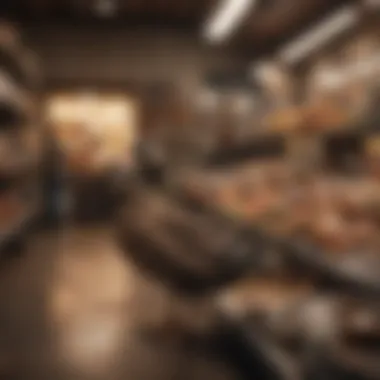
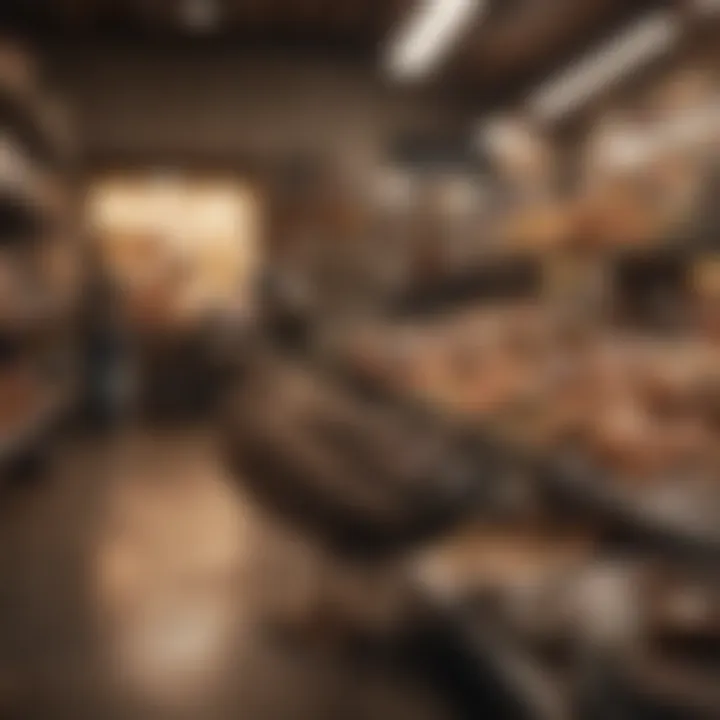
- Introduce more fresh vegetables: Leafy greens like kale, romaine, and spinach become excellent choices during the warmer months. Not only do they provide hydration, but they are also rich in essential vitamins.
- Be mindful of food temperature: Lighter feeding practices are important. Avoid heavy and energy-dense feeds that can induce stress on their system. Instead, focus on lighter pellets or crumbles, which can be easier on their digestive system in hot weather.
- Offer plenty of freshwater: Ducks need to stay hydrated. Regularly check and refresh their water to prevent it from getting too warm. Ducks love to dunk their heads and enjoy splashing around, so providing plenty of fresh, cool water sources can help cool them down.
Adapting to seasonal changes isn’t just about adjusting the feed. It’s about being observant and proactive. A content duck often reflects the care and responsiveness of its keeper. By adjusting their diet and feeding routines based on the season, you ensure that your ducks remain healthy and lively no matter the weather.
Homemade Duck Food Recipes
Creating homemade duck food can seem a bit daunting at first, but it’s truly an enjoyable and rewarding endeavor for both the ducks and their caregivers. Homemade recipes allow duck owners to have more control over the ingredients, ensuring that their pets get the nutrition they need without any fillers or undesired additives often found in commercial products. Plus, it opens the door to using fresh, organic ingredients that can be better for their overall health. Just like humans, birds also thrive on variety, making these recipes an excellent option to mix up the mundane diet that some commercial feeds offer.
Grain Mixes
Grain mixes form the backbone of a well-rounded diet for ducks. A simple grain mix can serve not only as a primary food source but also help promote healthy digestion and robust immune systems. You can customize these mixes based on what ingredients are available or what your ducks prefer, often indistinguishable from preferred restaurant dishes.
Here are a few grains that are safe and beneficial for ducks:
- Corn: This is a popular choice, often found ground or whole. It provides energy and is quite palatable for ducks.
- Oats: Rolled oats or oat groats are also good options. They are rich in fiber, which helps in digestion.
- Barley: Another excellent grain, barley is rich in essential nutrients and can keep your ducks feeling full and satisfied.
A straightforward recipe could look like this:
- 1 part Corn
- 1 part Oats
- 1 part Barley
- Optionally, you may add a sprinkle of flaxseed or change grain proportions based on your ducks' preferences or add bright colors with some dried vegetables for visual appeal.
Make sure to thoroughly mix the grains and store them in a cool, dry place. These can be supplemented with some fresh vegetables or fruits for added nutrition, ensuring that the ducks don’t get bored with their meals.
Vegetable Mashes
While grains are essential, they shouldn’t be the only item on the menu. Vegetable mashes are an excellent way to incorporate fresh vegetables into a duck’s diet. These not only provide important vitamins and minerals but also hydration, which is crucial for their overall health and well-being. Mashes are an easy way to combine various veggies in one nice dish that ducks can easily enjoy.
Here’s a simple recipe to make a vegetable mash:
- Carrots: Finely chopped or grated, they are rich in vitamin A.
- Peas: A great source of protein and packed with nutrients.
- Spinach: This leafy green delivers vitamins and minerals necessary for a duck's health.
- Pumpkin: Not only tasty but provides fiber, essential for digestion.
To make the mash:
- Steam or boil the vegetables until tender.
- Allow them to cool and then mash them up. You might even blend for an easier consistency.
- Save the leftovers or fridge any unused portion but don’t keep it too long – freshness counts!
The advantage of using such recipes is clear: you know exactly what your ducks are eating, link to their health directly, and can respond easily to their tastes.
Involving yourself in feeding can help deepen the bond with your ducks while ensuring they enjoy a rich, varied diet. Consider mixing it up constantly for better health and happiness.
In summary, homemade duck food recipes certainly enrich both the lives of the ducks and the enjoyment of the owners. It’s a fine balance between creativity and knowledge, wherein you can innovate while complying with the dietary needs of your beloved feathered companions.
Monitoring Duck Health Through Diet
Feeding ducks isn't just a matter of tossing bread crumbs into a pond. It's essential to monitor their health through their diet. Just like other pets, ducks require a balanced and nutritious diet to thrive. Improper feeding can lead to a variety of health issues, emphasizing the importance of understanding how to keep an eye on what they consume.
Regularly observing your ducks can provide insights into their health; changes in behavior or appearance might hint at nutritional deficiencies. A well-balanced diet not only supports their physical well-being but also contributes to their overall happiness. Therefore, incorporating proper monitoring strategies can lead to a more fruitful and enjoyable experience for both the ducks and their owners.
Identifying Nutritional Deficiencies
There’s no denying that an unbalanced diet can be the root of several problems. Recognizing what your ducks may be missing is crucial. Symptoms of nutritional deficiencies can often be subtle, but they leave marks. Here are some signs to look out for:
- Feathers: Dull, ragged, or uneven feathers can point to an inadequate intake of essential fatty acids or protein.
- Weight Changes: Noticeable weight loss or gain can indicate inadequate calorie intake or unbalanced feeding practices.
- Egg Quality: For egg-laying ducks like Khaki Campbells or Pekins, check for weak or thin eggshells, which might suggest calcium deficiencies.
- Behavioral Changes: Increased aggression or lethargy can be indications that something is off in their dietary regime.
Monitoring their drinking habits is just as important. Ducks in need of hydration might exhibit changes in activity levels or even strain in their movements. Always be observant of these factors to address potential deficiencies early.
Consulting with Veterinarians
When in doubt, consult with a veterinarian who specializes in avian creatures or farm animals. Their expertise can be priceless in identifying specific dietary needs and recommending adjustments based on the individual health status of your ducks.
Here’s why it’s beneficial to seek professional guidance:
- Expert Advice: Vets can provide tailored food recommendations based on specific health issues or developmental stages.
- Blood Tests: In some cases, vets might suggest blood tests to comprehensively analyze nutritional levels. This could be an eye-opener and guide you effectively on what to include in their diet.
- Prevention of Diseases: Regular check-ups can ideally prevent diseases that arise due to nutritional deficiencies. Your ducks become healthier with proactive measures in place.
Overall, proper engagement with veterinary professionals can help you build a solid dietary plan for your ducks, ensuring their good health and happiness. Don’t ignore the signs. A robust approach to monitoring their health through diet can make all the difference for your feathered friends.
Culmination
In summary, purchasing the right food for ducks is critical for ensuring their health and well-being. As we've explored throughout this guide, various options are available—each with its own benefits and pitfalls. An informed decision can not only enrich your ducks' diet but also keep them active and happy.
Summary of Key Points
To wrap things up, here are the main takeaways regarding duck food:
- Nutritional Needs: Understanding what ducks require nutritionally is paramount. Ducks thrive on a balanced diet that includes grains, vegetables, and high-quality commercial feed.
- Feeding Sources: Both local pet supply shops and online retailers provide a variety of feed options. Farmers’ supply stores often carry specific kinds, such as pellets or mash, tailored for ducks.
- Alternative Foods: Keeping in mind that ducks enjoy fruits and veggies, incorporating safe kitchen scraps can be beneficial. However, always avoid harmful options.
- Seasonal Considerations: Ducks’ dietary needs can shift with the changing seasons, necessitating adjustments in what and how often they are fed.
- Health Monitoring: Staying attuned to your ducks' health through their diet can be a game-changer. Watch for signs of nutritional deficiencies and consult with professionals if needed.
Importance of Researching Options
When it comes to feeding your ducks, doing a little homework can go a long way. The various choices available are not just a one-size-fits-all solution. Researching different products, whether they are organic feeds or alternative food sources, ensures that you find what best fits the specific needs of your ducks.
When you know what’s available, you can also identify which products are safe and beneficial. Each duck is unique and may respond differently to their diet, which means the more tailored your approach, the better the outcomes for their health. Additionally, understanding the brands, their reputations, ingredients, and costs can help you make financially sound decisions without sacrificing quality.







